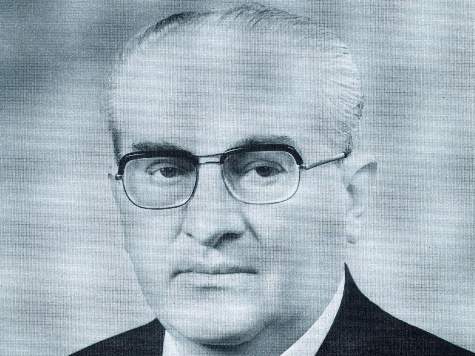Amid a public mood of nostalgia for a vanished Soviet empire, Russia is marking the 100th anniversary of the birth of the Soviet leader Yuri Andropov with exhibitions and documentaries that gloss over his harsh treatment of dissidents.
President Vladimir Putin lionised Andropov, who died in 1984, as “a man of talent with great abilities” in a message read out at the opening of a new exhibition dedicated to the late Soviet leader and former head of the KGB secret service.
The exhibition’s organisers made no attempt to question Andropov’s role in waging a harsh campaign against those who disagreed with Soviet ideology — or his controversial decision in 1983 to order the shooting down of a Korean airliner after it strayed into Soviet airspace, killing all 269 on board.
Memories of the incident have been stirred by the downing of a Malaysian airliner over the Ukraine earlier this month, which like the Korean tragedy led to the deaths of all on board, in an attack the West has indirectly blamed on Russia.
The bespectacled, silver-hair Soviet leader held the top post of general secretary of the Communist Party from 1982 after the death of Leonid Brezhnev, until 1984.
When he died at 78, he was succeeded by Konstantin Chernenko, an even older statesman, who died less than a year later, paving the way for Mikhail Gorbachev to take over.
Andropov presided over a regime that relegated renowned dissidents such as Natalia Gorbanevskaya, Leonid Plyushch and General Petro Grigorenko to psychiatric hospitals.
Their “mental illness” consisted only of defying the totalitarian Soviet system.
Under Andropov, a 33-year-old poet Yuri Galanskov died in a labour camp, as did the 85-year-old leader of Russia’s Seventh-Day Adventists, Vladimir Shelkov.
At the height of the Cold War in 1983, he notoriously gave the order to shoot down a Korean civilian airliner over fears that it deliberately entered Soviet airspace.
Official tributes to Andropov fit well with Putin’s drive to glorify the Soviet past as modern Russia has become increasingly nostalgic for its vanished empire since he came to power in 2000.
Critics would also say there are chilling echoes of Andropov today as Putin is also a former head of the secret services, has clamped down on dissidents, and has been accused by the West of supplying the missile that brought down Malaysia Airlines Flight MH17 over eastern Ukraine on July 17, killing 298.
Taking visitors back to the atmosphere of the Cold War-era Soviet Union and its propaganda, the exhibition at the Federal Archives has walls covered with posters featuring Andropov’s denouncements of “imperialist secret services” and Western “subversive operations”.
Yet while the exhibition, which runs to August, clearly concentrates on glorifying Andropov, some of the displays hint at his repressive style.
In a letter sent in 1951 to the Politburo, USSR’s supreme governing body, Andropov — who was then overseeing the Baltic states occupied by Soviet troops after World War II — requests permission to forcibly deport Lithuanian peasants.
The exhibition also highlights Andropov’s role in sending Soviet tanks to crush the 1956 anti-communist rebellion in Budapest when he was Soviet ambassador to Hungary and the period between 1967 and 1982 when he headed the KGB.
Several documents signed by Andropov concerning the dissident Yury Orlov and Jewish emigration campaigner Anatoly Sharansky show how the KGB staged dissidents’ trials.
– ‘Soviet jailer’ –
Andropov’s reports to the Politburo minutely describe the shadowing of the writer Alexandr Solzhenitsyn and dissident physicist Andrei Sakharov, who was accused of “anti-Soviet activities”.
But the exhibition avoids the darkest aspects of Andropov’s repression, which saw dissidents sentenced to lengthy jail terms in labour camps and exiled in Siberia or isolated in psychiatric hospitals and forcibly “treated” with neuroleptic drugs.
Other documents show KGB’s concerns over the smuggling to the West of the disgraced ex-Soviet leader Nikita Khrushchev’s seditious memoirs. Andropov suggested to the Politburo that they search Khrushchev’s dacha (a seasonal second home) to find the hidden manuscript.
Yet on display between two official documents is a vinyl record of a US jazz band, revealing that the great enemy of Westerners’ “decadent values” also loved American jazz music.
Russian television aired several documentaries that portrayed Andropov as an ideal leader, a fine diplomat, a reformer who was friendly to the intelligentsia and even an occasional poet.
But his critics disagree.

COMMENTS
Please let us know if you're having issues with commenting.